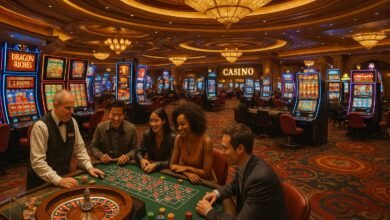Risk and Reward: Lessons from ‘Freakonomics’ in Online Casino Play

When we think about online casino play, the first thing that comes to mind is often the thrill of winning big. But behind the flashing lights and spinning reels of online slot machines is a complex interplay of risk and reward that can sometimes feel as unpredictable as the economy itself. If you’ve ever thought about the odds of winning or the mathematics of gambling, then you’re in for an interesting ride. Today, we’re diving into how some of the insights from the book Freakonomics can offer us a fresh perspective on online casino games, particularly slots. Let’s explore the fascinating world of risk, reward, and everything in between!
The Economics of Gambling: A ‘Freakonomics’ Perspective
In Freakonomics, Steven Levitt and Stephen Dubner challenge the way we look at incentives and decision-making. When it comes to gambling, the key is understanding how the house edge works and how it influences the long-term payouts. Just like the world of economics, online MMC33 casino play is shaped by a series of incentives. The casinos have an incentive to create games that are exciting and rewarding, but ultimately, they are built to ensure they make money.
Levitt and Dubner’s research highlights the hidden forces that influence our choices. In gambling, those forces often involve a combination of psychology and mathematics. Online slots, for example, use an algorithm known as Random Number Generation (RNG) to ensure that each spin is independent and random. While this might sound like a formula for chaos, it’s precisely how casinos maintain their advantage. Over time, the house edge guarantees that the odds of winning are stacked against you.
But does this mean all hope is lost for the casual gambler? Not necessarily.
Risk and Reward in Online Slot Machines
At the heart of online slot machines is the Return to Player (RTP) percentage. This number represents how much the game will pay back to players over time. For instance, if a slot has an RTP of 95%, it means that, theoretically, for every $100 wagered, the game will return $95 over an extended period of play at https://www.mmc9999.net/sg/en-us/.
This might sound like a good deal, but here’s where things get tricky. RTP doesn’t guarantee individual wins – it’s a long-term average. It’s possible to lose more than the RTP suggests in the short run, especially if you’re playing high variance slots. In these games, the potential for big payouts is there, but so is the risk of long-losing streaks.
In Freakonomics, Levitt and Dubner discuss the concept of incentives and how they shape decision-making. In online casinos, the incentive for players is often the potential of hitting a jackpot or receiving a bonus. For the casinos, the incentive is to keep players engaged, offering a bit of excitement while ensuring the house edge remains intact. It’s this balance that shapes the gambling experience.
The Psychology of Gambling: Why We Keep Playing
The psychology of gambling is another crucial factor, and this is where Freakonomics really hits home. People love to chase losses. The loss aversion theory suggests that we are more motivated by the fear of losing something than the potential for gaining. This plays directly into how people approach online casino play. After a few losses, players might feel the urge to keep spinning the reels, hoping to recover their losses or even hit a lucky streak. This psychological trap keeps players coming back, even when the odds are against them.
Casinos know this all too well, which is why they use reinforcement schedules to keep players engaged. Whether it’s a small win that sparks excitement or a bonus round that promises more chances to win, these little incentives are designed to keep you playing. It’s a game of chance, but with a built-in mechanism to keep you coming back for more.
Should You Play? Risk and Reward Balanced
The biggest lesson from Freakonomics when applied to online casino games is to understand the hidden forces that influence your choices. By recognizing that house edges and RTP play crucial roles in the outcomes, you can make more informed decisions. Here’s the thing: while you can’t predict the next spin on a slot machine, you can choose games with a better RTP or even try strategies like bankroll management to reduce risk.
Remember, the key to enjoying online casino play is to approach it with a clear understanding of the odds and a solid grasp of your limits. The risk is always there, but so is the reward—especially if you’re smart about how you play.
In conclusion, while the world of online slots might seem daunting, it’s not all about luck. By applying some of the principles from Freakonomics, you can better understand the incentives at play, the math behind gambling, and how psychological factors can affect your decisions. The balance of risk and reward is an essential aspect of any online casino experience, and with the right mindset, it’s possible to make more informed choices, maximizing your enjoyment and minimizing unnecessary losses.





